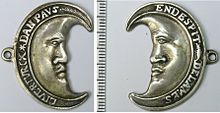
Back الإسلام والمسيحية Arabic ইসলাম ও খ্রিস্টধর্ম Bengali/Bangla Christlich-islamischer Dialog German مسیحیت و اسلام Persian A kereszténység és az iszlám Hungarian Hubungan Islam dengan Kekristenan ID Cristianesimo e islam Italian キリスト教とイスラム教 Japanese ქრისტიანობა და ისლამი Georgian Ислам және христиандық Kazakh
| Part of a series on |
| Christianity |
|---|
 |
| Part of a series on |
| Islam |
|---|
 |
| Islam and other religions |
|---|
| Abrahamic religions |
| Other religions |
| Islam and... |

Christianity and Islam are the two largest religions in the world, with approximately 2.8 billion and 1.9 billion adherents, respectively.[1][2] Both religions are Abrahamic and monotheistic, having originated in the Middle East.
Christianity developed out of Second Temple Judaism in the 1st century CE. It is founded on the life, teachings, death, and resurrection of Jesus Christ, and those who follow it are called Christians.[3] Islam developed in the 7th century CE. It is founded on the teachings of Muhammad, as an expression of surrendering to the will of God. Those who follow it are called Muslims (meaning "submitters to God").[4][5]
Muslims view Christians to be People of the Book, and also regard them as kafirs (unbelievers) committing shirk (polytheism) because of the Trinity, and thus, contend that they must be dhimmis (religious taxpayers) under Sharia law. Christians similarly possess a wide range of views about Islam. The majority of Christians view Islam as a false religion due to the fact that its adherents reject the Trinity, the divinity of Christ, the Crucifixion and Resurrection of Christ.
Like Christianity, Islam considers Jesus to be al-Masih (Arabic for the Messiah) who was sent to guide the Banī Isrā'īl (Arabic for Children of Israel) with a new revelation: al-Injīl (Arabic for "the Gospel").[6][7][8] But while belief in Jesus is a fundamental tenet of both, a critical distinction far more central to most Christian faiths is that Jesus is the incarnated God, specifically, one of the hypostases of the Triune God, God the Son.
While Christianity and Islam hold their recollections of Jesus's teachings as gospel and share narratives from the first five books of the Old Testament (the Hebrew Bible), the sacred text of Christianity also includes the later additions to the Bible while the primary sacred text of Islam instead is the Quran. Muslims believe that al-Injīl was distorted or altered to form the Christian New Testament. Christians, on the contrary, do not have a univocal understanding of the Quran, though most believe that it is fabricated or apocryphal work. There are similarities in both texts, such as accounts of the life and works of Jesus and the virgin birth of Jesus through Mary; yet still, some Biblical and Quranic accounts of these events differ.
- ^ "Christianity".
- ^ "Religion by Country 2021". Archived from the original on 2020-07-30.
- ^ "Christianity".
- ^ Gardet, L.; J. Jomier (2012). "Islām". In P. Bearman; Th. Bianquis; C.E. Bosworth; E. van Donzel; W.P. Heinrichs (eds.). Encyclopaedia of Islam (2nd ed.). Brill. doi:10.1163/1573-3912_islam_COM_038 (inactive 1 November 2024).
{{cite encyclopedia}}: CS1 maint: DOI inactive as of November 2024 (link)(subscription required) - ^ Bravmann, M. M. (1977), Studies in Semitic Philology, BRILL, p. 441, ISBN 90-04-04743-3
- ^ Glassé, Cyril (2001). The new encyclopedia of Islam, with introduction by Huston Smith (Édition révisée. ed.). Walnut Creek, CA: AltaMira Press. p. 239. ISBN 9780759101906.
- ^ McDowell, Jim, Josh; Walker, Jim (2002). Understanding Islam and Christianity: Beliefs That Separate Us and How to Talk About Them. Euguen, Oregon: Harvest House Publishers. p. 12. ISBN 9780736949910.
- ^ The Oxford Dictionary of Islam, p.158